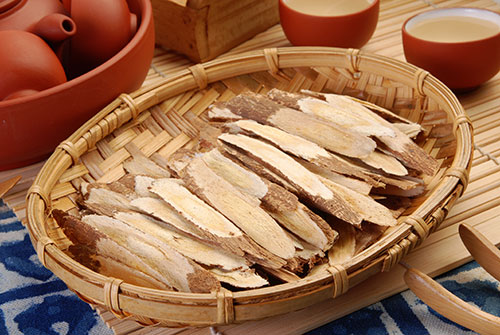Most people have heard of the herb astragalus. Usually it’s the first Chinese herb learned after ginseng, and maybe dang gui. Some know astragalus as the “tongue depressor” herb because its sliced bulk form is shaped like one (see photo above). Others know it as one of the best immune herbs available. And they wouldn’t be wrong.
Astragalus is a primary herb for boosting immunity, and is particularly useful for AIDS patients. It is added to detoxifying and eliminative formulas to protect the righteous Qi during chemotherapy and radiation. It is also often combined with ginseng or codonopsis for their Qi tonic synergy. Increasingly in China, whenever Qi tonification is needed, TCM doctors prefer to use astragalus. Another great (and traditional) combination is astragalus with reishi to boost immunity.
But astragalus has more traditional uses than this. Since it slightly tonifies Blood, it is often combined with dang gui to treat anemia, dizziness, blurry vision, numbness, scanty menses, and other symptoms of Blood Deficiency. It is used in recovery from loss of blood and postpartum fever due to Qi and Blood Deficiency. In fact, the usual combination is anywhere from 12 parts astragalus to 1 part dang gui. Because it takes Qi to build Blood, it’s more important to tonify Qi in this case and thus more astragalus is used.
Astragalus also helps alleviate wasting and thirsting disorders including diabetes, and stops spontaneous sweating. It treats non-healing sores and ulcers and assists in the elimination of pus. It aids proper fluid metabolism, promotes urination, and dispels edema from deficiency. It may even be given for fever due to Deficiency.
Further, astragalus has an ascending energy and so “raises the Yang,” treating diarrhea, organ prolapse, and bleeding due to Qi not holding the Blood in the vessels.
It is a wonderful herb to include in cooking as well. Slightly sweet and warm in energy, it combines well with soups, grains, stews, and stocks. Simply cook with food and remove before eating as it is very fibrous,
Astragalus comes in many forms and grades and thus, prices. Choose the sweetest as it is strongest.
Astragalus Root
Astragalus propinquus, formerly known as: A. membranaceus
Huang qi (Chinese); Also named: Astragali Radix
Family: Leguminosae
Energy and flavors: Slightly warm, sweet
Organs and channels affected: Spleen, Lung
Chemical constituents: Saponins, alkaloids, taraxerylacetate, friedelin, sucrose, glucose, inulin
Properties and actions: Immunomodulator, adaptogen, lowers blood pressure, diuretic, antibacterial, tonic; tonifies Qi and Blood, raises the Yang, stabilizes the Exterior, drains Dampness
Contraindications: Do not use for Excess Heat symptoms, Yin Deficiency with Heat, or toxic sores.
Dosage and preparation: Decoction, 9-15g; may be used up to 30g when needed. Standard tincture (1:5 @50% ABV). Pan-fry with honey to tonify the Spleen, with wine to tonify the Essence, or with salt to tonify the Kidneys. For anemia, combine 9-15g astragalus with 3g dang gui and take daily or add to meat soup.
Indications:
Anemia
Weak digestion
Night sweats, spontaneous sweating
Edema
Prolapse of uterus and anus
Chronic nephritis
Proteinuria
Chemotherapy and radiation therapy
AIDS
Wounds
Bleeding
Traditional Formula: Ginseng and Astragalus Combination (Bu Zhong Yi Qi Tang)
This is the classic formula to not only tonify Qi but also replenish the Kidneys (from the Spleen School point of view). It replenishes vital energy, tonifies the Spleen, Stomach and Lungs, and uplifts the Yang energy. It treats low energy, prolapse of organs, headache, irritability, shortness of breath, fatigue, spontaneous sweating, poor appetite, loose stools, thirst, and fever.
white atractylodes rhizome (Atractylodes macrocephela, bai zhi) 9-12g
astragalus root (Astragalus propinquus, huang qi) 6-15g
ginseng root (Panax ginseng, ren shen) 6-9g
dang gui root (Angelica sinensis) 6-9g
baked licorice root (Glycyrrhiza uralensis, zhi gan cao) 3-6g
bupleurum root (Bupleurum falcatum, chai hu) 6-9g
Chinese black cohosh root (Cimicifuga foetida, sheng ma) 3-6g
tangerine peel (Citri reticulatae, chen pi) 3-6g
Prepare as standard Chinese decoction. Drink 1 cup BID-TID.

